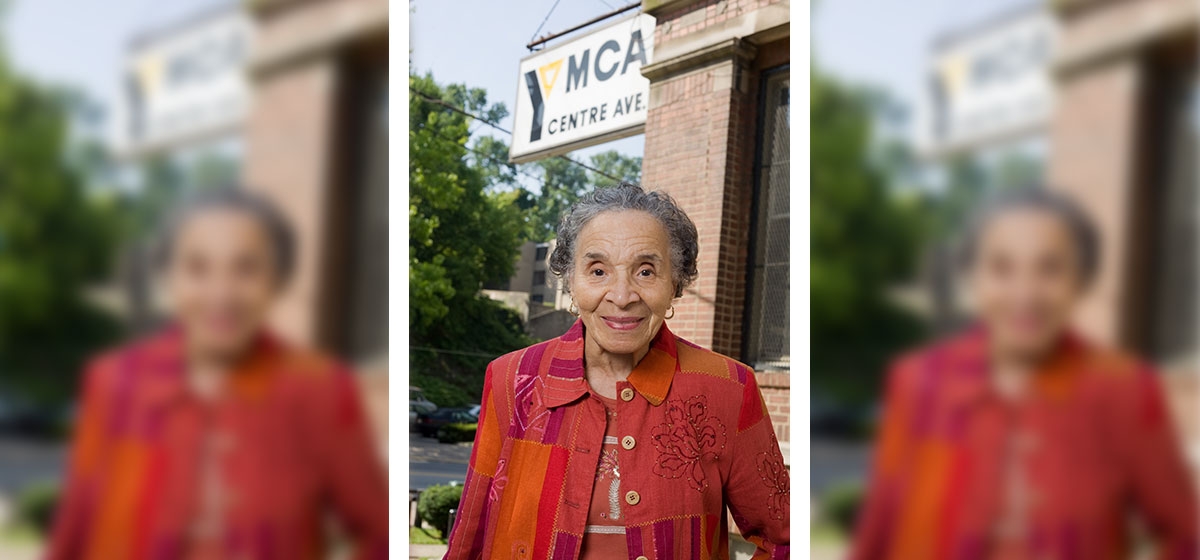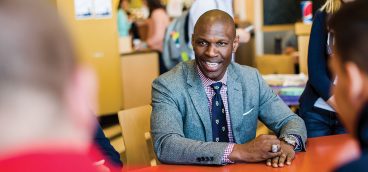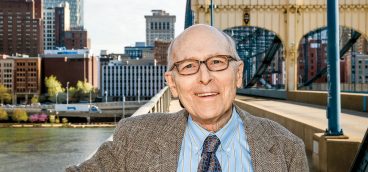Thelma Williams Lovette, Social Worker and Community Leader

I was born in Pittsburgh on Feb. 28, 1916, the fifth of 11 children. My family and I lived at 1520 Wylie Ave. in the Hill District. And we all looked out for each other.
In 1925, when I was just a girl, Mama and Papa took us to the opening of the Centre Avenue YMCA at Francis Street.
From then on, I went there regularly to watch the basketball games. They didn’t allow girls to participate back then, but I went because my oldest brother, Robert E. “Pappy” Williams, played there. (In time, he would become the first black police magistrate in the City of Pittsburgh, and the first black ward chair in the state of Pennsylvania.) So you see, the YMCA has been a part of my life for a long time.
My father, Henry M. Williams, was one of the first black registered plumbers in the City of Pittsburgh. His plumbing shop, which opened in May 1919, was on Crawford Street. Papa used to carry all of his tools on his back in this big plumbing bag. When indoor plumbing came along, he was one of the first to do that, including on Polish Hill. Everybody knew Papa. After all, he liberated many people from the inconvenience of the traditional outhouse.
Now, Papa was a wonderful man, but he had some rules. Go to school. And never be late. As a girl, I was a student at Minersville School. One day, my cousin and I left for school at the same time—and arrived late. When we got there, she said, “I’m just going to go home.” So I thought, well, if she’s going home, I’m going, too. When I got there, Papa asked me, “What are you doing here?” So I explained. Then he spanked me all the way back to school and told the principal, “This won’t happen again. If my daughter leaves home for school, she’s to go to school.” After that, I had perfect attendance.
My mother, Alice M. Johnson, was born in the Hill District in 1892, but my father came from Warrington, Va. According to him, his father was so strict that he just had to get away. So he hopped trains to Pittsburgh. When he got here, he met my mother’s father, who worked as a cook at the Monongahela House on Smithfield Street. He got Papa a job working with him as a short-order cook. One day, Grandpa invited Papa home for dinner, and the rest is history. He became one of the family and married my Mama when she was only 15.
I graduated from Schenley High School in 1934. Because of the Depression, it took me forever to get my graduation ring—and it only cost $5.25! One Friday, the school secretary announced on the intercom that Monday would be the last day for seniors to bring in their money. I went home and told Mama and Papa. During last period, my teacher said, “Miss Williams, you’re wanted in the office.” Now, if you were called to the office, that usually meant you were in trouble. The other kids asked, “Thelma, what did you do?” So I went to the office. When I got there, the secretary said, “Your brother just brought in $5.25 for you.” Robert looked like a giant standing there holding that money. And I still treasure that ring.
My first job after high school was washing dishes at the Ruskin Apartments for $10 a week. I had to be on the floor at 8 o’clock in the morning. I had a break for lunch—and would go into the girls’ locker room to put my feet up—and then I’d have to go back and wash the lunch dishes, then the dinner dishes. And I couldn’t leave until 8:30 or 9 p.m. It was tough, but it was a learning experience. If I wanted something, I knew that I was going to have to work for it. That was Papa’s philosophy. Looking back, I appreciate that job because it gave me stamina; it gave me an understanding of what life is all about.
Through the years, I continued to work hard. I was employed as an elevator operator at Bell Telephone when they integrated their workforce. Later, I worked for the Pittsburgh Public Schools as a “team mother” when the Team Teaching program first started, which was like being a teacher’s aide. I did that for a number of years and people kept remarking about what a caring person I was. So they made me a home-and-school visitor. Because of the relationships I built in the community with that job, I met some people at Mercy Hospital, and they asked me if I’d be interested in becoming a social worker. I said yes, of course, and they hired me—the first African-American in their Department of Social Work—even though I had no degree! They encouraged me to go to school, so I went to the University of Pittsburgh—I was in my 50s by then—and earned bachelor’s and master’s degrees. I went to school during the day and worked at Mercy in the evenings and on Saturdays and Sundays. It was hard, but I was very grateful for the opportunity.
So how did Thelma Williams become Thelma Lovette? Because of William J. Lovette. We grew up together. He gave me a baby doll at age four and told his family that he was going to marry me. “Thelma Willums,” he used to call me. He couldn’t pronounce “Williams.” Bill went into the service during World War II. He knew he was going to be going overseas, so he said he wanted to marry me before he went. Bill was stationed at Fort Huachuca, Ariz. (and eventually served throughout the South Pacific). I was in Pittsburgh with my family. But he said that he’d like to meet in Chicago for the wedding so that his mother and sister could take part. Thankfully, Mama and Papa said that I could go. So we met in Chicago and got married. That was 1942.
My Bill was a bright young man. Before the war, he worked in Chicago for the Jones brothers who, incidentally, were famous for running numbers. Bill rose to be the chauffeur for George Jones, and George recognized that Bill had a lot of smarts. So the Jones brothers encouraged him to attend the Illinois Institute of Technology, which he did, but the war prevented him from completing his last two years.
Bill was in the service for four years and when he came home, we settled in Chicago, and he went back to work for the Jones brothers. We stayed for two years and then moved to Pittsburgh, where he got work with a real estate company as a plumber. Bill became a plumber, like Papa. My father trained all of his sons to become plumbers. To this day, a nephew still is doing plumbing in Pittsburgh.
When I grew up, families were respected. They were part of life. You didn’t grow up alone. In fact, your neighbors were a part of your family because when we were kids, if our neighbors saw us doing something wrong and corrected us, that was all right. Our parents didn’t get into fights over such things. There was a strong feeling of community.
These days, that sense of community is not there because families have moved on. In my day, anything you wanted, you could get in the Hill. You didn’t need to leave. We all helped each other. We had grocers who would extend credit for food when we were short of money. Papa used to tell us, “When you earn money, spend it with Harry Rosenfield, because when you don’t have it, he’ll help you out.” I’ll never forget Harry.
So here we are in 2009. Things have changed, surely, from the days when we had to put newspaper in our shoes if there was a hole in the sole. That’s just the way it was. We didn’t think it was suffering. It was a way of life. We might have had some hard times, but we didn’t know they were hard times. It was just the norm. But we always had something to eat. We always had the hot biscuits Mama made. We always had dessert.
Now Barack Obama is in the White House, which is thrilling to me. But I remember a time when we couldn’t vote; not if you didn’t own property, not if you couldn’t sign your name. But Franklin D. Roosevelt helped to change things when I was young. We figured he was another Abraham Lincoln. Lincoln took us from slavery and Roosevelt reminded folks that we were people. We were men and women and had the right to participate.
Today, at 93, I can say that I’ve had a good and full life. Besides working, I liked to dance as a youngster—and I was pretty good—at the old Elmore Theatre. I took part in the March on Washington in 1963 and heard Dr. King’s famous speech. I was a delegate to the Democratic National Convention in 1984, the Pennsylvania floor whip. In 1996, I was nominated by the YMCA to be one of the Olympic torchbearers for Pennsylvania for the Atlanta games. Now they’re planning to name the new Centre Avenue YMCA after me, probably in 2010. It’s such an honor from an organization I’ve loved all my life.
One thing that I know is true is that we all need each other. If you have something that you think will benefit someone else, share it. That’s what I believe. I think that philosophy came from Mama and Papa because we were always taught to give something back.
Papa died in 1960 and Mama died in 1982. She was 90 when she passed and was not sick. She just went to sleep and didn’t wake up. She was very fortunate to have had relationships with all of her grandchildren. God blessed Bill and me with one daughter and I’m so grateful. She takes care of me. She and her husband are my parents now.
You know, my mother always wished to visit Africa to see where we came from. And we’d all say, “Mama, you don’t really want to go back there, do you?” Then she’d say, “Yes I do. I want to find out what it was like.” For my 90th birthday, my daughter took me to Africa. What an experience it was! I stood up on Table Mountain in South Africa and looked up to Heaven and said, “Mama, I’m here. And it’s beautiful.”





